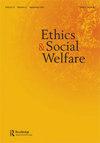Editorial
IF 0.9
Q4 SOCIAL WORK
引用次数: 0
Abstract
Just before this final issue of the year was being collated we were able to welcome a new addition to the editorial team. Our new colleague is Heidrun Wulfekühler, professor of ethics in social work at the University of Applied Sciences and Arts, Hannover, Germany. Heidrun has published widely in German and English, including valuable contributions to this journal in the last few years. She has held numerous academic and research positions at the University of Applied Sciences in Osnabrück, Faculty of Social Work and at the Wilhelms-Universität Münster Faculty of Philosophy. She also has experience of social work in Germany and the USA, working with a variety of service users. The editorial team are looking forward to working with her, and further developing our plans for the future of the journal. This final general issue of the journal contains some stimulating practice papers as well as thought-provoking academic papers. It is unusual but of interest that four papers (two academic papers and two practice papers) all originate in Aotearoa New Zealand – a country that has made headlines for good practice during the pandemic. However, the first paper in this issue by Merlinda Weinberg The Supremacy of Whiteness in Social Work Ethics is a careful but powerful examination of a topic to which both academics and practitioners need to pay close attention. The paper explores the minimisation of racism as an ethical issue in the field of social work (a topic also evident in the Aotearoa New Zealand papers), and is illustrated by two research studies with racialized practitioners. Weinberg also explores the influence of Kant on traditional approaches to ethics in social work, arguing that there is a difficulty with universal principles as interpreted in social work ethics in the Global North, with potentially harmful consequences. The paper offers a more focused and specific study, complementing an earlier paper in this journal on a similar topic – ‘decolonizing white care’ – by Shona Hunter, (Hunter, 2021). Kathryn Muyskens, a US political philosopher with special interests in the politics of health and has contributed the second paper entitled A Human Right to What Kind of Health? She offers a link to the first paper insofar as it is also critical of assumptions about the universality of universal rights to health, contending that an explicitly political and pluralistic account would more appropriately help guide international and cross-cultural interventions on behalf of health. She concedes the importance of an enforceable minimum standard of health, but asserts that it also needs to admit a large degree of cultural flexibility. Muyskens aims to clarify what makes up that minimum standard in a way that avoids unjustified parochial bias, while avoiding the danger of undermining the force of a widely accepted universal human right. In their paper, Koen Gevaert, Sabrina Keinemans & Rudi Roose examine the problem of prioritising in youth care in Flanders, the Dutch-speaking part of Belgium. The article’s analysis of Prioritising Cases in Youth Care: An Empirical Study of Professionals’ Approaches to Argumentation, shows that workers take a personal stance on the criteria for assigning priority where there are scarce resources. The authors’main conclusion is that the prioritisation process illustrates the moral-political core of decision-making practice, even (perhaps especially) when it appears to be just a technical issue. It raises the issue of whether professionals are as aware as they might be of their own processes of argument and interpretation.社论
就在本年度最后一期整理之前,我们迎来了编辑团队的新成员。我们的新同事是德国汉诺威应用科学与艺术大学社会工作伦理学教授Heidrun Wulfekühler。Heidrun以德语和英语发表了大量文章,包括过去几年对该杂志的宝贵贡献。她曾在奥斯纳布吕克应用科学大学社会工作学院和威廉大学明斯特哲学学院担任过多个学术和研究职位。她还拥有在德国和美国从事社会工作的经验,与各种服务用户合作。编辑团队期待着与她合作,并进一步制定我们对该杂志未来的计划。这本期刊的最后一期包含了一些令人振奋的实践论文以及发人深省的学术论文。不同寻常但令人感兴趣的是,四篇论文(两篇学术论文和两篇实践论文)都来自新西兰奥特亚,该国在疫情期间因良好实践而成为头条新闻。然而,Merlinda Weinberg在本期的第一篇论文《社会工作伦理中的白人至上》对一个学术界和从业者都需要密切关注的话题进行了仔细但有力的审视。该论文探讨了将种族主义最小化作为社会工作领域的一个道德问题(这一主题在新西兰的Aotearoa论文中也很明显),并通过两项针对种族主义从业者的研究进行了说明。温伯格还探讨了康德对社会工作伦理传统方法的影响,认为在全球北方的社会工作伦理中解释普遍原则存在困难,可能会产生有害后果。这篇论文提供了一项更为集中和具体的研究,补充了Shona Hunter在本杂志上发表的一篇类似主题的论文——“白人护理的非殖民化”(Hunter,2021)。Kathryn Muyskens,一位对健康政治有特殊兴趣的美国政治哲学家,发表了第二篇题为《享有何种健康的人权?她提供了与第一篇论文的链接,因为它也批评了关于普遍健康权普遍性的假设,认为明确的政治和多元的解释将更有助于指导代表健康的国际和跨文化干预措施。她承认可执行的最低健康标准的重要性,但声称它也需要承认很大程度的文化灵活性。Muyskens旨在澄清是什么构成了这一最低标准,以避免不合理的狭隘偏见,同时避免破坏广泛接受的普遍人权的力量的危险。Koen Gevaert、Sabrina Keinemans和Rudi Roose在他们的论文中研究了比利时荷兰语区佛兰德斯的青年护理优先问题。这篇文章对《青年护理中的优先案例:专业人员论证方法的实证研究》的分析表明,在资源稀缺的情况下,工作人员对分配优先权的标准持个人立场。作者的主要结论是,优先顺序过程说明了决策实践的道德政治核心,即使(也许尤其)当它看起来只是一个技术问题时。它提出了一个问题,即专业人士是否像他们可能的那样意识到自己的论证和解释过程。
本文章由计算机程序翻译,如有差异,请以英文原文为准。
求助全文
约1分钟内获得全文
求助全文
来源期刊

Ethics and Social Welfare
SOCIAL WORK-
CiteScore
1.60
自引率
20.00%
发文量
36
期刊介绍:
Ethics and Social Welfare publishes articles of a critical and reflective nature concerned with the ethical issues surrounding social welfare practice and policy. It has a particular focus on social work (including practice with individuals, families and small groups), social care, youth and community work and related professions. The aim of the journal is to encourage dialogue and debate across social, intercultural and international boundaries on the serious ethical issues relating to professional interventions into social life. Through this we hope to contribute towards deepening understandings and further ethical practice in the field of social welfare. The journal welcomes material in a variety of formats, including high quality peer-reviewed academic papers, reflections, debates and commentaries on policy and practice, book reviews and review articles. We actively encourage a diverse range of contributions from academic and field practitioners, voluntary workers, service users, carers and people bringing the perspectives of oppressed groups. Contributions might include reports on research studies on the influence of values and ethics in social welfare practice, education and organisational structures, theoretical papers discussing the evolution of social welfare values and ethics, linked to contemporary philosophical, social and ethical thought, accounts of ethical issues, problems and dilemmas in practice, and reflections on the ethics and values of policy and organisational development. The journal aims for the highest standards in its published material. All material submitted to the journal is subject to a process of assessment and evaluation through the Editors and through peer review.
 求助内容:
求助内容: 应助结果提醒方式:
应助结果提醒方式:


